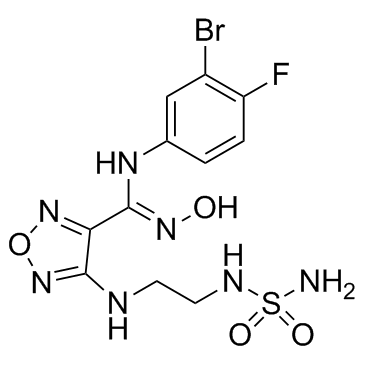1204669-58-8
| Name | epacadostat |
|---|---|
| Synonyms |
N-(3-Bromo-4-fluorophenyl)-N'-hydroxy-4-{[2-(sulfamoylamino)ethyl]amino}-1,2,5-oxadiazole-3-carboximidamide
epacadostat UNII 71596A9R13 (Z)-N-(3-bromo-4-fluorophenyl)-N'-hydroxy-4-[2-(sulfamoylamino)ethylamino]-1,2,5-oxadiazole-3-carboxamidine INCB024360 INCB024360/IDO inhibitor 1 INCB 024360 |
| Description | Epacadostat (INCB 024360) is a potent and selective indoleamine 2,3-dioxigenase 1 (IDO1) inhibitor with an IC50 of 71.8 nM. |
|---|---|
| Related Catalog | |
| Target |
IDO1:71.8 nM (IC50) |
| In Vitro | In cellular assays, Epacadostat (INCB 024360) selectively inhibits human IDO1 with IC50 values of approximately 10 nM, demonstrating little activity against other related enzymes such as IDO2 or tryptophan 2,3-dioxygenase (TDO). Epacadostat (INCB 024360) also exhibits significant activity toward mouse IDO1, with an IC50 value of 52.4 nM±15.7 nM, in a similar assay using mouse IDO1-transfected HEK293/MSR cells[1]. |
| In Vivo | Female Balb/c mice bearing CT26 tumors are treated orally twice daily for 12 d with Epacadostat at 100 mg/kg. Epacadostat (INCB 024360) suppresses kynurenine equivalently in plasma, tumors, and lymph nodes. In naïve C57BL/6 mice, 50 mg/kg Epacadostat (INCB 024360) decreases plasma kynurenine levels within 1 hour and those levels stay at least 50% suppressed through the 8-hour time course[2]. |
| Cell Assay | To determine Epacadostat activity against IDO in recombinant cells, HEK293/MSR cells are transiently transfected with full-length human or mouse IDO1, or mouse IDO2 cDNA, with Transit-293 transfection reagent or Lipofectamine 2000 reagents. Epacadostat (INCB 024360) at different concentrations is added to the recovered transfected cells seeded at 2×104 cells per well in a 96-well plate (200 μL/well). The cells are incubated for 2 days, and kyn in the supernatants is measured as described in the HeLa cell assay. The tryptophan 2,3-dioxygenase (TDO) assay is performed similarly with HEK293/MSR cells transfected with a human TDO expression vector[1]. |
| Animal Admin | Mice[2] The female C57BL/6 mice are dosed orally with 50 mg/kg Epacadostat. C57BL/6 wild-type or Ido1-/--deficient mice are administered a single oral dose of Epacadostat (INCB 024360), at which point food is removed from the cages until after the 8-h time point. At various time points after dosing, mice are euthanized and blood is collected by cardiac puncture. Plasma is analyzed for the presence of Epacadostat (INCB 024360), tryptophan, and kynurenine according to the methods below. |
| References |
| Density | 2.0±0.1 g/cm3 |
|---|---|
| Boiling Point | 672.3±65.0 °C at 760 mmHg |
| Molecular Formula | C11H13BrFN7O4S |
| Molecular Weight | 438.233 |
| Flash Point | 360.4±34.3 °C |
| Exact Mass | 436.991699 |
| LogP | 3.92 |
| Vapour Pressure | 0.0±2.2 mmHg at 25°C |
| Index of Refraction | 1.742 |
| Storage condition | 2-8°C |
